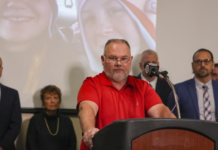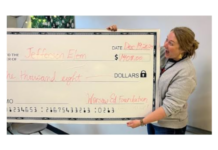In response to the rapid spread of COVID-19 in northern Indiana last year, the Northern Indiana Hispanic Health Coalition (NIHHC) spearheaded the call to action throughout Kosciusko County.
The COVID-19 pandemic hit northern Indiana hard, disproportionately affecting the Hispanic community. Positivity rates and total number of cases in the region have been among the highest statewide. In Kosciusko County, Hispanics comprise 8% of the population, but make up as much as 45% of those diagnosed with COVID-19.
As numbers surged at the onset of the pandemic, it became clear that disparities in disease rates, exposure, testing and prevention among Hispanics presented a health emergency for the community. NIHHC quickly partnered with government agencies, healthcare providers and community organizations to meet healthcare needs. A top priority was overcoming barriers to healthcare that are related to language, access to health insurance, income, transportation, technology, stigma and awareness – all contributing factors to a pandemic that worsens inequities.
“The ability to fight a pandemic requires everyone to be involved,” said K21 Health Foundation President and CEO Rich Haddad. “NIHHC brought leadership to engage and solve needs for our Hispanic residents in Kosciusko County, through awareness, education, and services in testing and vaccination.”
NIHHC was highly involved in the overall community strategy, added Haddad, not just the actions implemented to help fight the virus. “We are very grateful for what NIHHC has done and continues to do to help our community in the ongoing battle with COVID-19,” he said.
Warsaw Mayor Joseph Thallemer pointed out that collaboration efforts with NIHHC moved his office to distribute bilingual health information, establish welcoming testing sites, and promote vaccine education. “I am most thankful for this partnership,” he said.
NIHHC was the first organization in the area to open a bilingual COVID-19 hotline, which answers questions and provides follow-up regarding testing locations, symptoms, prevention and vaccination. In November 2020, the number of calls spiked to 400 incoming calls in one month.
Such assistance reaches beyond the caller or simply answering a question. In June, just as factories and other businesses opened up again after the spring shutdown, Angy Cruz’s parents went back to work. A few days later, her dad was showing symptoms. He tested positive, but the site that tested him wouldn’t test the rest of her family because they weren’t showing symptoms – yet.
One of her sisters had volunteered for NIHHC in the past and immediately thought to call the organization, which got the rest of the family set up at another site that would test them.
Cruz said the uncertainty surrounding their lives was stressful. Their workplaces were very strict about requiring proof that they were positive while they were waiting for results. There was no protocol in place to quarantine if exposed. They were left with two choices: risk losing their jobs or risk spreading COVID-19.
Zuleyja Prieto, the hotline provider, emphasized that Cruz’s family is just an example of the reality that many Hispanic families face. “I was constantly in contact with Angy’s household and extended family. I walked them through symptoms, hospitalization, recovery, securing temporary financial support and processing bills for the COVID-19 tests through CARES Act money,” she explained.
Simultaneously, NIHHC developed a bilingual Frequently Asked Questions pamphlet, which provides clear and straightforward information about COVID-19 symptoms, prevention, testing and exposure, and includes customized inserts on county resources and testing sites. Over 150,000 copies of the pamphlet have been distributed since May 2020.
Eight months later, as needs shifted, NIHHC developed a second bilingual FAQ pamphlet on COVID-19 vaccinations to educate and encourage the community to get vaccinated. Electronic distribution was extended to families in Warsaw Community Schools.
From the beginning, NIHHC offered interpretation services at testing sites and advocated for culturally sensitive services. “It is important not just to speak the language of the patients you are serving,” said Quintero, “but to be culturally sensitive to their concerns and understand what is really preventing them from getting tested or vaccinated.”
Quintero worked hard to advocate for the community’s needs in meetings with officials at the Indiana State Department of Health. Focusing on ensuring sites were located where Hispanics feel comfortable and safe, Quintero also asked for better site operational hours and reasonable patient eligibility requirements. By advocating for site accessibility and providing staff to support them, the number of testing sites in the region expanded overall.
Over 4,000 hours of interpretation services later, NIHHC staff remain at the forefront of COVID-19 related services, providing assistance at Elkhart County’s COVID-19 Call Center by answering questions and registering people for vaccinations.
NIHHC offers weekly virtual classes, broadcast live in Spanish on Facebook, addressing COVID-19-related topics. It provides similar health education via weekly radio interventions on WKAM 1460 La Raza Radio station, which broadcasts from Kosciusko County to St. Joseph County.
As the vaccine rollout is underway and many remain out of work, the impact of the pandemic has not subsided. The same barriers Hispanics faced in getting tested and treated for COVID-19 are now confronting them when they try to get vaccinated. Hispanics as a group have a low vaccination rate, but they are not alone. Providing education on vaccines and making registration accessible for all individuals who face language and technology barriers improves the system for everyone.
“Removing barriers to healthcare is fundamental to increasing preventative care,” said Carl Ellison, president and CEO of the Indiana Minority Health Coalition. “This crisis has brought inequities in healthcare to the public’s attention, but we need to continue advocating for the community’s needs, so that leaders at the county and state level can implement government policies that will increase access to health services for the community as a whole.”
Ellison’s view reflects the path ahead of us. While the COVID-19 pandemic has presented new challenges and exacerbated existing ones, NIHHC paved the way forward, and it hopes to see many of the changes in services it helped to implement here to stay.





